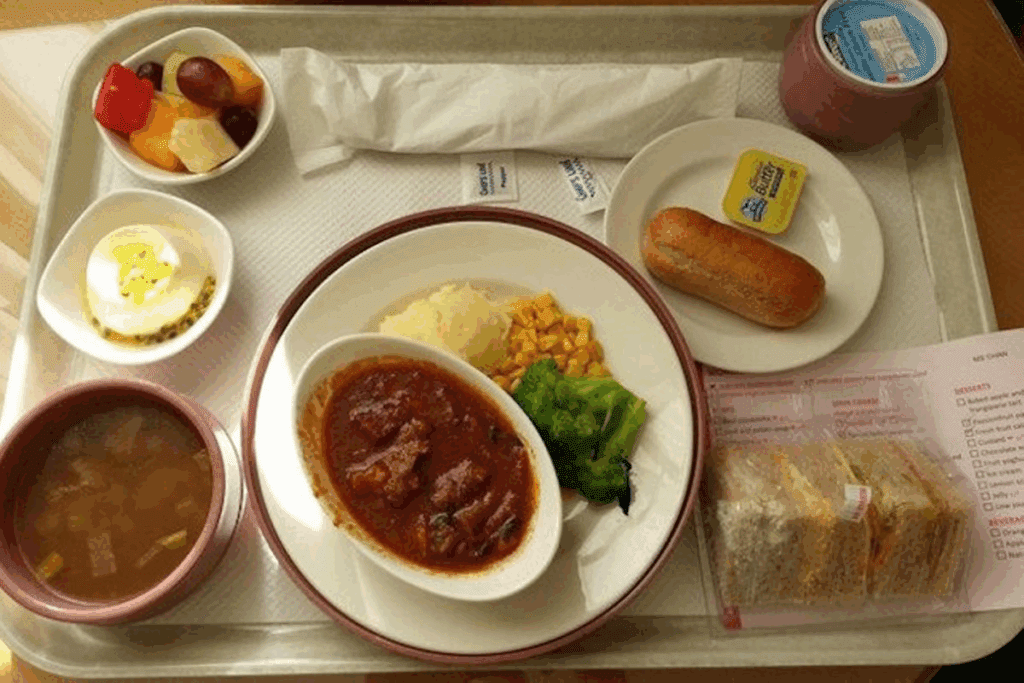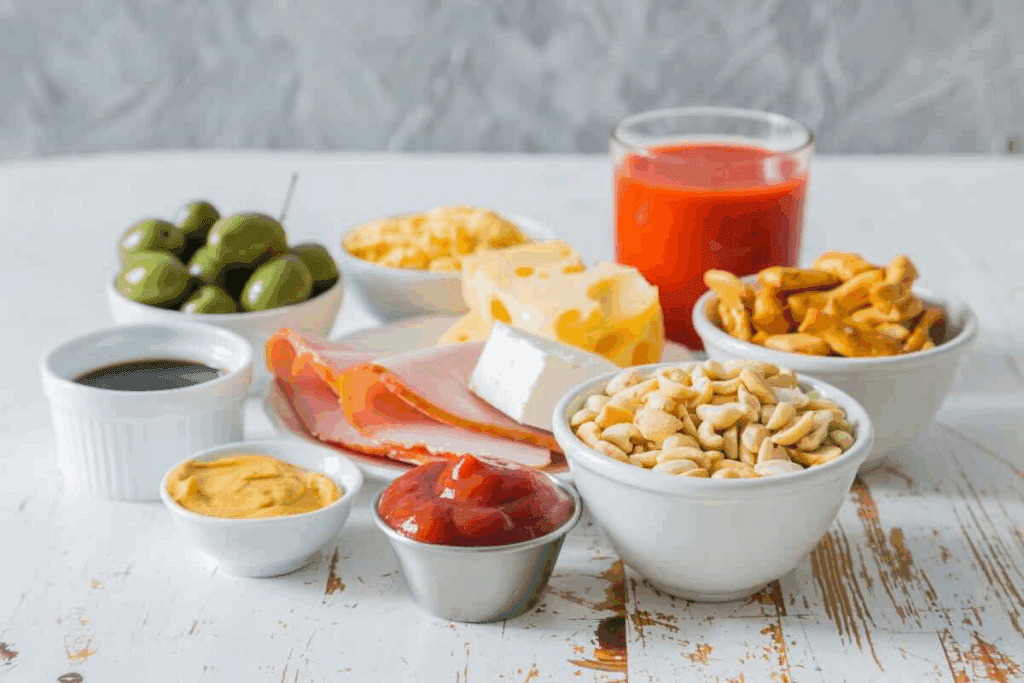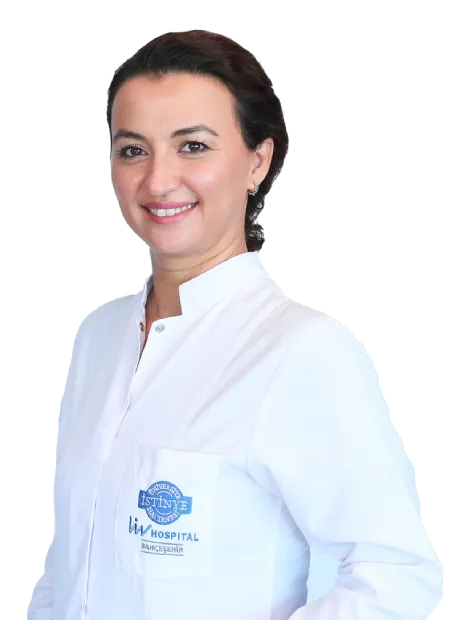
Keeping your colon healthy is key to feeling good. What you eat matters a lot for colon health. Eating foods high in fiber, fruits, veggies, whole grains, dairy, fish, nuts, and legumes can lower colon cancer risk. Learn the top foods and diet to prevent colon cancer and maintain a healthy colon naturally.
Experts say focus on plant foods and lean proteins. Nonstarchy veggies and raw fruits are full of vitamins, minerals, fiber, and antioxidants. Adding these to your meals helps protect your colon.
Key Takeaways
- Eat a variety of whole foods to support colon health.
- Emphasize plant foods and lean protein in your diet.
- Include nonstarchy vegetables and raw fruits in your daily meals.
- A well-balanced diet can reduce the risk of colon cancer.
- Incorporate foods rich in fiber, vitamins, and minerals into your diet.
Understanding the Link Between Diet and Colon Cancer

It’s important to know how diet affects colon cancer risk. The foods we eat greatly impact our colon’s health. Research shows that some diets can lower or raise our risk of colorectal cancer.
How Food Choices Impact Colon Health
Our diet is key to keeping our colon healthy. Foods with omega-3s, antioxidants, and phytochemicals are good for us. They help fight inflammation and protect the colon lining.
Eating lots of fruits and veggies can also help. Studies and experts like Salina Lee, MD, show that these foods can lower death rates from colon cancer.
“Diets high in fruit and vegetables may decrease mortality rates with colon cancer.” – Salina Lee, MD, Gastroenterologist at Rush University Medical Center.
Our diet affects colon health through specific nutrients. These nutrients help keep the colon lining strong and support a healthy gut. Eating a variety of whole foods can give us these nutrients.
The Science Behind Dietary Prevention
The science of diet and colon cancer prevention is complex. Antioxidants and phytochemicals play a big role. They help reduce oxidative stress and inflammation in the colon.
A table below shows some key dietary components and their benefits.
| Dietary Component | Benefit |
| Omega-3 Fatty Acids | Reduces inflammation |
| Antioxidants | Protects against cell damage |
| Phytochemicals | May reduce cancer risk |
Experts say diets rich in these components are good for colon and rectal health. By choosing the right foods, we can lower our colon cancer risk.
The Power of Fiber-Rich Foods for Colon Protection

Foods high in fiber are key for a healthy colon and digestion. They help get rid of waste and keep the gut healthy. This is important for stopping colon cancer.
We suggest adding whole grains and legumes to your meals. They are full of fiber and good for you. Whole grains, for example, have lots of vitamins and minerals.
Whole Grains: Your Colon’s First Line of Defense
Whole grains are packed with fiber and protect against colon cancer. They keep the gut healthy and help remove waste. Good examples are brown rice, quinoa, whole wheat bread, and pasta.
| Whole Grain | Fiber Content (per serving) | Health Benefits |
| Brown Rice | 3.5 grams per 1 cup cooked | Rich in magnesium and selenium |
| Quinoa | 5.2 grams per 1 cup cooked | Complete protein and rich in iron |
| Whole Wheat Bread | 4.4 grams per 1 slice | High in B vitamins and fiber |
Legumes: Protein-Packed Colon Protectors
Legumes are also great for colon health. They are full of fiber and protein, making them good for those who eat plant-based. Beans, lentils, and peas are examples.
Legumes lower colon cancer risk by keeping the gut healthy and removing waste. They also have lots of nutrients and antioxidants for overall health.
Colorful Fruits That Fight Colon Cancer
Eating colorful fruits can help lower colon cancer risk. These fruits are full of antioxidants, fiber, and phytochemicals. They protect against cancer. Adding colorful fruits to your meals boosts nutrition and supports colon health.
Berries: Antioxidant Powerhouses
Berries like strawberries, blueberries, and raspberries are antioxidant-rich. They contain anthocyanins and ellagic acid, which fight cancer. These compounds protect cells, reduce inflammation, and slow cancer cell growth.
Nutritional Benefits of Berries:
- High in antioxidants
- Rich in fiber
- Contain anti-cancer compounds
Citrus Fruits: Vitamin C and Beyond
Citrus fruits like oranges, grapefruits, and lemons are vitamin C-rich. They also have other nutrients and phytochemicals that fight colon cancer. The limonoids in citrus fruits have anti-cancer effects.
The Role of Vitamin C: Vitamin C is an antioxidant. It protects cells and boosts the immune system.
Apples: The Fiber-Flavonoid Combination
Apples are full of dietary fiber and flavonoids like quercetin. These have anti-inflammatory properties. The fiber and flavonoids in apples support colon health and lower cancer risk.
Here’s a comparison of the nutritional benefits of some colorful fruits:
| Fruit | Antioxidant Capacity | Fiber Content | Key Phytochemicals |
| Blueberries | High | Moderate | Anthocyanins |
| Oranges | Moderate | High | Vitamin C, Limonoids |
| Apples | Moderate | High | Quercetin |
Eating colorful fruits helps support colon health and lowers colon cancer risk. A balanced diet and healthy lifestyle are key to well-being.
Vegetables That Reduce Colorectal Cancer Risk
Eating a variety of vegetables can lower your chance of getting colorectal cancer. They are full of nutrients, fiber, and phytochemicals that fight cancer.
Cruciferous Vegetables: Broccoli, Cauliflower, and Cabbage
Cruciferous veggies are great for fighting colorectal cancer. They have glucosinolates, which help detoxify harmful substances and stop tumors. Broccoli, cauliflower, and cabbage are top picks for your diet.
Leafy Greens: Spinach, Kale, and Collards
Leafy greens are full of antioxidants and fiber. They’re key for preventing colorectal cancer. Spinach, kale, and collard greens have folate, which lowers cancer risk. They also have chlorophyll, which fights off cancer-causing agents.
Garlic and Onions: Allium Vegetables’ Protective Effects
Allium veggies, like garlic and onions, have sulfur compounds that fight cancer. They can stop tumors and boost your immune system. Adding garlic and onions to your meals can make your diet more effective against colorectal cancer.
Adding a variety of veggies to your diet can greatly lower your risk of colorectal cancer. Make sure to include veggies in your meals to get their cancer-fighting benefits.
Omega-3 Rich Fish for Colon Health
Omega-3 fatty acids in some fish help keep the colon healthy and might lower colon cancer risk. Adding these foods to your diet can help keep your colon in top shape.
Salmon, Mackerel, and Sardines
Salmon, mackerel, and sardines are full of omega-3s, like EPA and DHA. These fats fight inflammation, which could help prevent colon cancer. Eating these fish regularly might lower the risk of colon polyps and cancer.
- Salmon: It’s loaded with omega-3s and antioxidants, making it great for colon health.
- Mackerel: This fish is not just rich in omega-3s but also in vitamin D. Vitamin D helps protect the colon too.
- Sardines: These small, oily fish are full of omega-3s. They’re also affordable and good for the colon.
How Omega-3s Combat Inflammation
Chronic inflammation in the colon can lead to cancer. Omega-3s help by:
- Modulating the immune response: Omega-3s affect cytokine production. Cytokines are important for the immune system.
- Reducing inflammatory markers: Omega-3s can lower inflammatory markers in the body. This might reduce colon cancer risk.
- Promoting a healthy gut microbiome: Omega-3s also support good gut bacteria. This is key for colon health.
Eating omega-3 rich fish can help keep your colon healthy. It’s part of a balanced diet that includes fruits, vegetables, and other healthy foods. Omega-3 fish are important for fighting colon cancer.
Nuts and Seeds: Small Foods with Big Benefits
Nuts and seeds are packed with nutrients that help prevent colon cancer. Adding them to your meals can boost your colon health.
Omega-3 Rich Nuts and Seeds
Walnuts and flaxseeds are great for their omega-3 fatty acids. These fats help reduce body inflammation, a key to avoiding colon cancer. Omega-3s support overall health and are easy to add to your diet with walnuts and flaxseeds.
Vitamin E Defenders
Almonds and sunflower seeds are full of vitamin E, a cell protector. Vitamin E is vital for a healthy colon by fighting oxidative stress. Adding a handful of almonds or sunflower seeds daily can greatly help your colon health.
To get the most from nuts and seeds, eat them as part of a balanced diet. It’s good to mix different types to get a wide range of nutrients. Pumpkin seeds, chia seeds, and pistachios are also great, each with its own benefits.
When you add nuts and seeds to your diet to avoid colon cancer, follow these tips:
- Snack on a mix of nuts and seeds every day.
- Add ground flaxseeds or chia seeds to your breakfast cereal or yogurt.
- Use almonds or walnuts in salads for extra nutrition.
By making these small changes, you can greatly improve your colon health and lower colon cancer risk. A diet to avoid colon cancer should include a variety of nuts and seeds, along with other nutrient-rich foods.
Probiotic-Rich Foods for Gut Microbiome Health
Probiotic-rich foods are key for a healthy gut, which helps prevent colon cancer. A balanced gut microbiome is vital for our health. Adding probiotics to our diet can greatly help in achieving this balance.
Yogurt and Kefir: Dairy Probiotics
Yogurt and kefir are known for their live cultures of good bacteria. These probiotics help keep our gut healthy by supporting good bacteria and fighting bad ones. Always choose yogurt or kefir with “live and active cultures” for the best benefits.
Studies show that yogurt with probiotics can strengthen our gut and boost our immune system. Kefir, with its many probiotic strains, also offers benefits like better digestion and less inflammation.
Fermented Foods: Kimchi, Sauerkraut, and Kombucha
Fermented foods are also packed with probiotics. Kimchi, sauerkraut, and kombucha are great examples. They not only support gut health but also provide important vitamins and minerals.
Kimchi is full of vitamins A, C, and K, and minerals like calcium and iron. Sauerkraut, made from fermented cabbage, is rich in vitamin C and has anti-inflammatory compounds. Kombucha, a fermented tea, has probiotics, B vitamins, and other beneficial compounds.
Adding these probiotic-rich foods to our diet is easy. Start by adding yogurt or kefir to breakfast, snacking on kimchi or sauerkraut, or enjoying kombucha as a drink.
| Probiotic-Rich Food | Probiotic Benefits | Nutritional Benefits |
| Yogurt | Enhances gut barrier function, boosts immune system | High in protein, calcium |
| Kefir | Improves digestion, reduces inflammation | Rich in protein, calcium, vitamins |
| Kimchi | Supports gut health, anti-inflammatory properties | Rich in vitamins A, C, K, minerals |
| Sauerkraut | Promotes beneficial bacteria, anti-inflammatory properties | High in vitamin C, fiber |
| Kombucha | Supports gut health, antioxidant properties | Contains B vitamins, probiotics |
By adding these probiotic-rich foods to our diet, we can boost our gut health and lower colon cancer risk. A balanced diet and a healthy lifestyle are key to our overall well-being.
The Optimal Diet to Prevent Colon Cancer
Eating right is key to keeping your colon healthy and avoiding cancer. The right foods can greatly lower your risk of colon cancer. We’ll look at the best foods for preventing colon cancer.
Balancing Macronutrients for Colon Health
It’s important to balance your macronutrients for good health, including your colon. Eating lots of whole grains, fruits, and veggies gives you fiber, vitamins, and minerals. The Mediterranean diet, with its focus on whole grains, fruits, veggies, and healthy fats, is great for preventing colon cancer.
“The Mediterranean diet has been shown to reduce the risk of various cancers, including colorectal cancer, due to its high content of antioxidants and fiber,” says, a renowned oncologist.
A good diet should have complex carbs, lean proteins, and healthy fats. Whole grains like brown rice, quinoa, and whole-wheat bread give you energy and fiber. Lean proteins from poultry, fish, and legumes are good for your health. Healthy fats in nuts, seeds, and olive oil are good for your heart and may fight inflammation.
Creating a Cancer-Fighting Meal Plan
Making a meal plan with cancer-fighting foods is a smart step against colon cancer. Start by eating a variety of colorful fruits and veggies. They’re full of antioxidants and phytochemicals. Berries, citrus fruits, and apples are great because they’re packed with antioxidants.
Adding cruciferous veggies like broccoli, cauliflower, and cabbage to your meals is also good. They have sulforaphane, which fights cancer. Legumes like beans, lentils, and chickpeas are full of fiber and protein, making them great for a cancer-fighting diet.
Supplements vs. Whole Foods Approach
While supplements are helpful, eating whole foods is better for preventing colon cancer. Whole foods give you a mix of nutrients, fiber, and phytochemicals that work together for health. “Relying on whole foods instead of supplements ensures you get a wide range of nutrients,” says a nutrition expert.
But, some people might need certain supplements, like calcium or vitamin D, under a doctor’s advice. Always talk to a healthcare provider before adding supplements to your diet, if you’re at high risk for colon cancer or have a family history.
Foods to Limit or Avoid for Colon Cancer Prevention
It’s key to know which foods to limit or avoid to prevent colon cancer. A good colorectal diet means understanding how different foods affect our colon health.
Red and Processed Meats: The Cancer Connection
Eating too much red and processed meat can raise your risk of colon cancer. Red meats are beef, pork, and lamb. Processed meats include bacon, sausages, and deli meats. The exact reasons are unclear, but preservatives, high iron, and cooking methods might play a part.
To lower this risk, try eating less of these meats. Opt for chicken, fish, or plant-based foods instead.
Highly Processed Foods and Added Sugars
Highly processed foods are bad for our health, including our colon. They’re often full of added sugars, salt, and unhealthy fats. These foods lack nutrients and fiber, making them bad for a diet for colon cancer prevention.
Examples include packaged snacks, sugary cereals, and ready-to-eat meals. Cutting down on these foods can help us eat healthier.
Healthier Alternatives and Substitutions
Choosing healthier options is a smart way to reduce risks. For red and processed meats, pick lean poultry, fish, or plant-based proteins. For processed foods, go for whole foods like veggies, fruits, and whole grains.
By making smart food choices, we can help prevent colon cancer through diet.
Practical Tips for Implementing a Colon-Healthy Diet
We can help our colon health by making smart food choices and lifestyle changes. A colon-healthy diet means being careful about what we eat and how we prepare it.
Gradual Dietary Changes for Lasting Results
Starting small can lead to big changes in our diet. We can start by eating more fruits and vegetables. Try to have different colors on your plate for a variety of nutrients.
Another good change is to eat less red meat. Try going meatless on certain days and explore plant-based proteins like legumes and nuts.
Shopping and Meal Prep Strategies
Good meal planning and prep are key for a colon-healthy diet. Here are some tips:
- Plan your meals for the week, focusing on whole grains, fruits, and veggies.
- Make a shopping list to avoid buying things you don’t need.
- Prep ingredients ahead of time, like chopping veggies or cooking legumes.
- Cook big batches and freeze meals for easy access.
| Food Group | Colon-Healthy Choices | Tips for Incorporation |
| Fruits | Berries, citrus fruits, apples | Add to oatmeal or yogurt, snack on fresh fruit |
| Vegetables | Leafy greens, cruciferous vegetables, carrots | Include in salads, stir-fries, or as steamed sides |
| Protein | Legumes, nuts, seeds, fatty fish | Use in place of red meat, add to salads or soups |
Dining Out While Maintaining a Protective Diet
Eating out doesn’t have to hurt our colon-healthy diet. We can make smart choices by:
- Picking restaurants with lots of veggie options.
- Choosing grilled or baked fish and poultry over fried.
- Going for whole grain options when they’re available.
- Being careful with portion sizes to avoid overeating.
By being proactive and making smart food choices, we can keep our diet healthy even when eating out.
Beyond Diet: Lifestyle Factors That Complement Dietary Prevention
Our lifestyle choices can greatly affect our risk of colon cancer. A healthy diet is key, but other factors are also important. They help make our diet even more effective.
Physical Activity and Colon Cancer Risk
Regular exercise lowers the risk of colon cancer. It helps keep a healthy weight, improves insulin sensitivity, and reduces inflammation. These benefits can lower colon cancer risk. The American Cancer Society suggests 150 minutes of moderate or 75 minutes of vigorous activity weekly.
“Physical activity is a key part of a healthy lifestyle,” says the American Cancer Society. It not only lowers colon cancer risk but also boosts overall health and happiness.
Maintaining a Healthy Weight
Keeping a healthy weight is vital for colon cancer prevention. Being overweight or obese increases colon cancer risk, more so in men. A healthy weight comes from a balanced diet and regular exercise.
The National Cancer Institute notes, “Obesity raises the risk of colon cancer.” So, it’s important to keep a healthy weight through a balanced lifestyle to lower colon cancer risk.
Screening and Early Detection
Screening and early detection are key in fighting colon cancer. Regular screening can spot precancerous polyps early, before they turn cancerous. There are many screening tests, like colonoscopy, fecal occult blood tests, and stool DNA tests.
The CDC advises adults 45 and older to get screened for colon cancer. Early detection through screening can greatly improve treatment success and survival rates.
In summary, diet is important for colon cancer prevention, but other lifestyle factors matter too. Physical activity, maintaining a healthy weight, and regular screening are all critical. By focusing on overall health, we can lower our risk of colon cancer significantly.
Conclusion: Empowering Your Colon Health Through Food Choices
As we wrap up our look at foods that help prevent colon cancer, it’s clear that a smart diet is key. Eating foods high in fiber, colorful fruits and veggies, omega-3 fish, nuts, seeds, and probiotics can lower your colon cancer risk.
A healthy diet and lifestyle are essential for your overall health. We’ve learned how food choices affect your colon health. By making smart food choices, you can lower your risk of colon cancer.
To prevent colon cancer, eat lots of whole grains, legumes, and different fruits and veggies. Avoid too much red and processed meat. Adding regular exercise and keeping a healthy weight can help even more. This way, you can take a big step towards lowering your colon cancer risk.
FAQ
What are the best foods to eat to prevent colon cancer?
A diet full of fiber-rich foods like whole grains, legumes, and colorful fruits is key. Omega-3 rich fish, nuts, and seeds also help. Plus, probiotic-rich foods like yogurt and fermented foods boost gut health.
How does diet impact colon health?
A balanced diet with whole foods can greatly lower colon cancer risk. It provides nutrients, fiber, and antioxidants. These help keep the gut healthy and aid in waste removal.
Are there specific foods that can help prevent colon polyps?
Yes, foods rich in fiber, antioxidants, and phytochemicals like whole grains, fruits, and veggies are good. Omega-3 rich foods and probiotics also support colon health.
What foods should be limited or avoided to prevent colon cancer?
Limit red and processed meats, highly processed foods, and those with added sugars. Choose healthier options to keep your diet balanced.
Can supplements replace whole foods in preventing colon cancer?
Supplements can help, but whole foods are best for colon cancer prevention. Whole foods offer a mix of nutrients, fiber, and phytochemicals that support colon health.
How can I implement a colon-healthy diet in my daily life?
Start by adding more fiber-rich foods and omega-3 rich fish to your diet. Plan meals, shop for whole foods, and prepare healthy meals in advance.
Are there lifestyle factors beyond diet that can help prevent colon cancer?
Yes, regular exercise, a healthy weight, and screening programs can help. These lifestyle choices complement a healthy diet in preventing colon cancer.
What is the role of probiotics in colon cancer prevention?
Probiotics help maintain a healthy gut microbiome, which is key in preventing colon cancer. Include probiotic-rich foods like yogurt, kefir, and fermented foods in your diet.
How can I maintain a colon-healthy diet while dining out?
Choose restaurants that serve whole, unprocessed foods. Opt for dishes with lots of fruits, veggies, and whole grains. Be careful of portion sizes and avoid fried or highly processed foods.
References:
Centers for Disease Control and Prevention. (2023). What Can I Do to Reduce My Risk of Colorectal Cancer? https://www.cdc.gov/cancer/colorectal/basic_info/prevention.htm


































